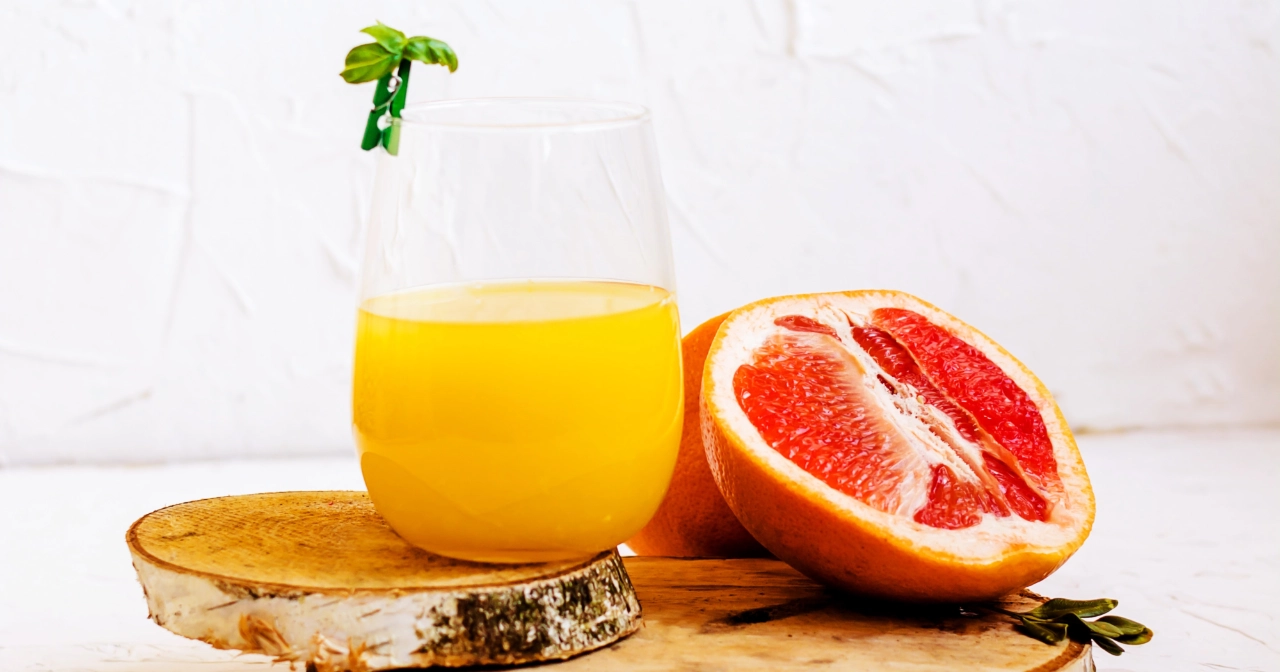Listen on: Apple Podcasts | Spotify
Besides eating a high-protein diet, few nutrition changes make as big of a difference in people’s health as eliminating calorie-containing beverages from their diets. This includes 100% fruit juice.
Unfortunately, on any given day, about half of adults and two-thirds of children consume sugar-sweetened beverages.1Sugar-Sweetened Beverage Consumption among U.S. Youth, 2011-2014. https://stacks.cdc.gov/view/cdc/44039. Accessed 2 Jan. 2023. Fruit juice is the most common of such beverages.
Contrary to public health recommendations, heavily influenced by the companies who sell the beverages, fruit juice, soda, and other sugary beverages have no place in a “healthy diet.”
The “Fruit Juice Is Healthy” Hoax
One cup of apple juice contains 28 grams of carbohydrates, 24 grams of which come from sugar. An 8-ounce serving of Coca-Cola contains 24.6 grams of sugar. In both beverages, most of the sugar comes from fructose.
The reality is the two beverages aren’t much different from one another. Sprinkle in a negligible amount of vitamins into the Coca-Cola, and they’d be virtually the same from a nutrition and metabolism standpoint.
How could this be? How could the U.S. dietary guidelines explicitly state that fruit juice is an acceptable replacement for whole fruit if it’s not much better than soda? How could the labels on fruit juice bottles lead you to believe they’re good for you when they’re not?
A glimpse into the relationships between the government, the Academy of Nutrition and Dietetics, and the food industry helps you understand. It isn’t that different from the relationships between the government, the American Medical Association, and the pharmaceutical industry regarding vaccines. One hand feeds the other in an ongoing cycle that benefits these groups, often at the expense of the people using their products.
The Academy of Nutrition and Dietetics (AND), formerly known as the American Dietetics Association, licenses registered dietitians (RDs), the supposed “experts” on nutrition in the healthcare system. If you’ve dealt with a disease or a family member has, you’ve probably met with a dietitian.
Funny enough, when I was in the hospital after I broke my neck, I asked for extra chicken on one of my entrees. They told me it wasn’t allowed without a consultation with a dietitian. I laughed at the absurdity. That said, not all dietitians are bad. I’ve worked with many amazing dietitians over the years. They were the ones who took it upon themselves to understand nutrition science rather than take the word of the professors they learned from in school.
A paper published in Public Health and Nutrition titled The corporate capture of the nutrition profession in the USA: the case of the Academy of Nutrition and Dietetics provides a unique view into how the organization is influenced.
A non-profit organization called US Right to Know got access to some of the AND’s internal communications through a Freedom of Information (FOI) request. The communications revealed:
In 2015, when AND’s partnership with Kraft was disclosed and criticised by the public, the AND/ANDF BOD dropped the deal. However, the documents gathered through FOI show they privately continued to engage with corporations by: (i) investing AND funds in shares of Nestlé, PepsiCo and several pharmaceutical company stocks; (ii) accepting corporate contributions without disclosing their size, (iii) allowing BOD (board of directors) members to work for or consult for companies with interests that conflict with the mission of the AND, (iv) discussing internal policies within the BOD to fit industry needs, ignoring the work of the SATF, (v) allowing corporations to support AND’s members research and (vi) releasing public positions favouring corporations.
Carriedo A, et al. The corporate capture of the nutrition profession in the USA: the case of the Academy of Nutrition and Dietetics.
In essence, the AND:
- Invested in the companies that gave them sponsorship funds, even though their products conflict with what’s considered “healthy.”
- Took contributions from those companies without showing how much they gave.
- Allowed AND board of director members to work for the companies that make products shown to contribute to obesity and disease.
- Allowed food industry companies to fund and shape nutrition research.
- Did all of the above and then created position statements that favored these companies, ultimately influencing public health recommendations and dietary guidelines.
It shouldn’t surprise us, then, when the U.S. Dietary Guidelines suggest that fruit juice is an acceptable replacement for whole fruit.
Beating the “Calorie Balance” Drum
How do they spin it? How could they suggest that beverages with so much sugar could be considered “healthy?”
By beating the “calorie balance” drum to death.
You’ll often see a storyline like this: Fruit juice and sugar-sweetened beverages can be part of an overall healthy diet when used in moderation, provided one’s total calorie intake is appropriate. As long as such beverages do not create a calorie surplus in one’s diet, they won’t lead to weight gain or ill health.
The idea is that if you consume fewer calories than you burn, you lose weight. If you consume the same number as you burn, you maintain it. And if you consume more, well, you get fat. This simplistic notion of weight management is almost as old and outdated as the AND itself (established in 1912).
The types of calories you consume matter. A lot. And, though sugar is bad enough as it is, too much fructose is especially detrimental to your health, no matter how many calories you consume each day.
Read more: 5 Reasons Low-Calorie Diets Don’t Work Long-Term.http://dietary guidelines
Health Problems Associated with Drinking Fruit Juice
Like soda, most of the sugar in fruit juice comes from fructose. Fructose is metabolized differently from sucrose and has a more detrimental effect on metabolism. Fructose doesn’t cause a significant rise in blood sugar and therefore does not trigger insulin release in the same way sucrose does.
At one point in time, doctors and dietitians believed that fructose was a healthier sugar for this very reason. Today, we know that fructose can put significant stress on the liver, the only organ that metabolizes it. It also leads to numerous health problems.
For example, drinking fruit juice, even if it’s “100% juice,” is associated with weight gain and reduced height in children.2“Dennison BA, Rockwell HL, Baker SL. Excess fruit juice consumption by preschool-aged children is associated with short stature and obesity [published correction appears in Pediatrics 1997 Oct;100(4):733]. Pediatrics. 1997;99(1):15-22.,3Shefferly A, Scharf RJ, DeBoer MD. Longitudinal evaluation of 100% fruit juice consumption on BMI status in 2-5-year-old children. Pediatr Obes. 2016;11(3):221-227. doi:10.1111/ijpo.12048 It also doubles the risk of asthma in children.4DeChristopher, Luanne R., and Katherine L. Tucker. “Excess Free Fructose, Apple Juice, High Fructose Corn Syrup and Childhood Asthma Risk – the National Children’s Study.” Nutrition Journal, vol. 19, no. 1, June 2020, p. 60. BioMed Central, https://doi.org/10.1186/s12937-020-00578-0.
It’s also associated with weight gain in post-menopausal women and adults in general.5Auerbach BJ, Littman AJ, Krieger J, et al. Association of 100% fruit juice consumption and 3-year weight change among postmenopausal women in the in the Women’s Health Initiative. Prev Med. 2018;109:8-10. doi:10.1016/j.ypmed.2018.01.004
Fructose, the main sugar in fruit juice and soda, increases blood levels of very low-density lipoproteins (VLDL), which can increase visceral fat and systemic inflammation, raising the risk of developing heart disease.6Stanhope KL, Schwarz JM, Keim NL, et al. Consuming fructose-sweetened, not glucose-sweetened, beverages increases visceral adiposity and lipids and decreases insulin sensitivity in overweight/obese humans. J Clin Invest. 2009;119(5):1322-1334. doi:10.1172/JCI37385 It also raises uric acid levels, which then increases blood pressure,7Nakagawa T, Hu H, Zharikov S, et al. A causal role for uric acid in fructose-induced metabolic syndrome. Am J Physiol Renal Physiol. 2006;290(3):F625-F631. doi:10.1152/ajprenal.00140.2005 and is seen as the main cause of non-alcoholic fatty liver disease (NAFLD).8Ouyang, Xiaosen, et al. “Fructose Consumption as a Risk Factor for Non-Alcoholic Fatty Liver Disease.” Journal of Hepatology, vol. 48, no. 6, June 2008, pp. 993–99. ScienceDirect, https://doi.org/10.1016/j.jhep.2008.02.011.
Evidence also suggests that fructose consumption could lead to neurodegeneration.9Spagnuolo MS, Iossa S, Cigliano L. Sweet but Bitter: Focus on Fructose Impact on Brain Function in Rodent Models. Nutrients. 2020;13(1):1. Published 2020 Dec 22. doi:10.3390/nu13010001
Finally, a 2022 review found that for every 100 grams of fruit juice consumed per day (about half a cup), the risk of all-cause mortality increases by 9%.10Zhang Z, Zeng X, Li M, et al. A Prospective Study of Fruit Juice Consumption and the Risk of Overall and Cardiovascular Disease Mortality. Nutrients. 2022;14(10):2127. Published 2022 May 19. doi:10.3390/nu14102127
Does fruit juice contain some vitamins and minerals? Sure. But you can get them from other foods or supplements. The negligible amounts don’t offset the negative effects on your health.
Also, drinking calories does not affect satiety like eating them does.11Pan A, Hu FB. Effects of carbohydrates on satiety: differences between liquid and solid food. Curr Opin Clin Nutr Metab Care. 2011;14(4):385-390. doi:10.1097/MCO.0b013e328346df36 That’s why a guy can drink a half-dozen gluten-free beers at night and still have room for dinner, or why you can drink a protein shake after a workout and feel hungry an hour later. Carbohydrate-only beverages, such as fruit juice or soda, though, do almost nothing to curb your appetite, whereas the protein in the protein shake would curb it a bit, while also having a much better effect on your metabolism and body composition.
One final, often overlooked effect of sugary foods and beverages is that they change one’s palate. If you grow up consuming lots of sweet foods and beverages, or other highly-palatable foods, you’ll be less inclined to choose healthier, unprocessed options. The sooner you can wean yourself off sweets, and treat them as something for special occasions, the sooner you’ll be able to find a healthier diet more appealing.
Are there any healthy beverage options?
You might wonder, are any calorie-containing beverages okay? Yes. A few. And there are plenty of options when it comes to low or no-calorie, flavored beverages.
Protein shakes, assuming they’re low in carbs are alright for most people. Keep in mind, though, that they’re not as satiating as whole food. They’re a great way to boost your protein intake, but I don’t recommend them as a way to replace meals for most people. I recommend protein powders made with whey or egg over plant-based protein sources.
Milk, especially for kids is okay. It may even be helpful for growth and development. I understand that dairy is controversial, and some people don’t tolerate it. However, for most people, it offers a source of high-quality protein, often lacking in their diets. I covered the dairy topic in my article Is Milk or Other Dairy Good Or Bad For You?
Sports drinks with electrolytes and sugar can be helpful for athletes who train intensely, especially in high heat. They’re totally unnecessary for kids playing Little League, though. If you need to replenish your electrolytes, you can do so without drinking extra sugar. A couple of great options include:
- Young Living Vitality Drops: Just squirt some into your water and drink (this is one of my Dad’s favorite YL products)
- LMNT Electrolyte Mix: Robb Wolf is one of the founders, which adds a lot of credibility to the quality.
A glass of wine or a serving of hard liquor now and then isn’t bad for you, but if you need to drink alcohol every day, that can become a serious problem. That’s a topic that deserves its own article at some point.
And, of course, there’s a myriad of non-calorie, flavored and sweetened beverages as well. We drink a lot of Zevia in our home.
The bottom line is that there’s no need to drink sugar, even if it come from fruit. Not only is it a lot less nutritious than you’ve been told, it can lead to long-term health consequences. Like regular soda, it’s more of a liquid candy than it is any sort of healthy food.
Photo by Євгенія Височина on Unsplash



